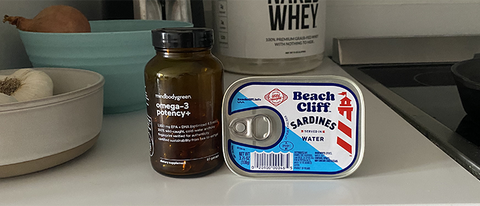
Fish oil supplements are one of the most popular supplement categories worldwide, as more and more research emerges on the health benefits of omega-3 fatty acids that are unique to fish oil.
But are fish oil supplements a healthier option than just eating whole fish? What's the cost breakdown per serving? And are there any unique health risks associated with either option?
In this article we'll answer all of these questions and more as we compare the health effects and cost of fish oil supplements with whole fish consumption.
We'll also review the health benefits of omega-3 fatty acids including an animated video, and then conclude by giving our recommendation for which is a better option overall.
Which is Cheaper?
The National Institutes of Health recommends a daily omega-3 dose of 1.6 grams (g) for adult men and 1.1 g for adult women. Below is a breakdown of how much it costs per day to obtain that dosage via supplements or whole fish.
Bulletproof Omega Krill Complex is our top fish oil supplement pick, because it provides 1.21 g of omega-3 per softgel and is free of any questionable additive ingredients (it's naturally-flavored with lemon oil).
This supplement costs $49.95 and contains 120 softgels, equating to a price-per-day of only $0.42. Interested consumers can check out Bulletproof Omega Krill Complex at this link to the product page on the official brand's website.
Wild Planet Sardines is our top whole fish brand, because sardines are shown in medical research to be one of the fish types lowest in mercury, and this brand packs them in water and is free of any questionable flavoring ingredients.
This product costs $32.52 for a 12-pack and each can contains 8 g of fat. The omega-3 fatty acid dose isn't listed because this isn't required for whole foods, but we can assume that one can provides an adequate dose. This equates to a price-per-day of $2.71.
It's clearly more cost-efficient to get your omega-3 fatty acids from fish oil supplements than from whole fish, but is one option healthier than the other? We'll examine in the next section.
Which is Healthier?
Fish oil, like nearly all unprocessed oils, is subject to degradation over time. It’s especially susceptible to oxidation according to medical research. This means that fish oil degrades relatively quickly and can form harmful byproducts like hydroperoxides.
Fish oil also tends to be high in heavy metals like lead and mercury due to environmental contamination.
Fish oil is healthy and the benefits certainly outweigh any downsides, but to get the most benefit, consumers should ensure they're getting a high-quality product with as little oxidation and contaminants as possible.
ConsumerLab, which is the most reputable online supplement and food testing resource, tested both fish oil supplements and canned fish.
93% of fish oil supplements passed purity testing, and 91% of canned fish products passed purity testing. This suggests that fish oil supplements may be a healthier option because they often undergo purification prior to sale.
We Compared the Two Ourselves

As one of the authors of this article (Calloway), I wanted to try both fish oil supplements and whole fish myself to share my thoughts about which is the superior option.
I used a high-quality omega-3 fish oil supplement for around a month, and the next month I purchased eight cans of wild-caught sardines and made four meals out of them.
The convenience of the fish oil was excellent. If I realized I had gone a few days without eating any fish, I simply took two capsules with my first meal of the day.
The pills were rather large and could be tough to swallow for some people (as many fish oil pills are), but they had no distinct odor or taste.
I felt like I was getting more for my money with the canned sardines, given that each can was barely over $1.
Two cans constituted all of my animal protein for the day, and I would simply have a scoop or two of hemp powder with my second meal to fulfill my daily protein requirement.
I don't suffer from joint pain or depression, so I didn't experience notable benefits from either product, but I try to consume omega-3 fatty acids on a regular basis as a health and prevention measure.
Overall, I prefer eating whole fish to taking fish oil supplements, because I have no concerns about the freshness of whole fish, it's more cost-efficient, and I'm also getting protein with its consumption.
Omega-3 Health Benefits
Omega-3 fatty acids are thought to be responsible for most of the health benefits of fish, especially eicosapentaenoic acid (EPA) and docosahexaenoic acid (DHA) which are not found in most plant sources of omega-3.
Here are some of the clinically proven benefits of omega-3 consumption:
Anti-Inflammatory
Chronic inflammation is a major source of health issues in modern society. People today eat a diet with processed foods, exercise less and stress more than our ancestors, and these factors combined can cause chronic, low-grade inflammation throughout the body.
Omega-3 fatty acids from fish were shown in a 2004 medical review to have potent anti-inflammatory effects and to reduce the risk of cardiovascular disease.
As we documented in our review of Relief Factor, omega-3s are clinically shown to reduce pain due to their anti-inflammatory effect.
Supports Healthy Cholesterol
Fish oil supplementation can reduce triglyceride levels, which is a type of cholesterol associated with increased risk of cardiovascular events.
A clinical trial published in the Nutrition, Metabolism and Cardiovascular Diseases journal found that that 4 g per day of DHA + EPA led to significant decreases in triglyceride levels.
Anti-Depressant
One of the beneficial effects of fish oil which is the least discussed is its effects on mood. Inflammation can cause negative changes to mental health, so it makes logical sense that a potent, natural anti-inflammatory may have an antidepressant effect.
An Examine review summarized 28 clinical trials on fish oil to treat depression and found that it "seems to notably reduce the symptoms of depression."
In one of the cited clinical trials, depression scores decreased by over 50% after eight weeks of fish oil supplementation.
Animated Video on Fish Oil Health Benefits
A YouTube channel called "Bestie" published a video on some of the research-backed health benefits of fish oil that has over 35,000 views:




















































